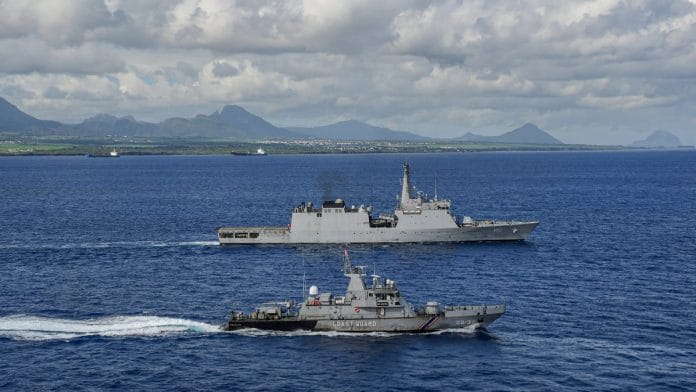New Delhi: India must bolster its own naval capabilities in the Indian Ocean region, along with creating a more “flexible” security framework with Quad partner countries, as New Delhi stares down a growing China-Pakistan naval nexus, the parliamentary committee on external affairs recommended in a report Monday.
“The Committee expresses concern regarding the escalating Chinese presence and its increasing influence in the Indian Ocean Region (IOR), a development which poses substantial risks to India’s national security and broader strategic interests,” the report titled “Evaluation of India’s Indian Ocean Strategy” said.
The committee led by Congress Member of Parliament Shashi Tharoor added in the report that, “of equal concern is the strengthening of the China-Pakistan naval nexus, which not only facilitates joint military exercises but also advances Pakistan’s naval modernization. This cooperation complicates the security situation further, particularly in the context of the increasing Chinese influence over Pakistan’s naval assets, which could destabilize the balance of power in the region.”
The committee held two hearings in December 2024 and June 2025 respectively and heard from officers from both the Ministry of External Affairs and the Ministry of Defence to understand the security and diplomatic challenges facing India’s policy in the larger Indian Ocean.
There are 35 littoral states in the Indian Ocean Region (IOR), of which New Delhi maintains diplomatic missions in 32.
India is the largest nation in the IOR and has for long considered the region a key pillar of its security strategy. But in recent years “extra-regional” actors such as China have been building “dual-use” infrastructure projects across the region giving it a significant strategic heft, the committee noted.
In Sri Lanka, for example, the Chinese-controlled port of Hambantota has often been cited as an example of Beijing’s growing use of infrastructure projects to build diplomatic inroads within countries in the IOR.
The committee highlighted China’s growing military capacity, as it has come to operate the world’s largest naval force, including the use of advanced warships and submarines, to “consolidate” its influence in the region.
“The strategic positioning of Chinese military and commercial infrastructure across key maritime chokepoints, particularly under the Belt and Road Initiative (BRI) and the “String of Pearls” strategy, is gradually reconfiguring the region’s geopolitical dynamics in favor of Chinese interests,” said the report.
The parliamentary committee has urged the government of India to strengthen its own deterrence capabilities and “conduct” joint exercises with partner countries to maintain “strategic balance”.
Just last week, India conducted its first joint naval exercises with the Philippines in the South China Sea, as it looks to build maritime partnerships across the Indo-Pacific. However, in particular to the IOR, the committee has called on India to bolster its own Navy through the induction of anti-submarine warfare vessels, surveillance aircraft and nuclear-powered submarines to ensure readiness to respond to any emerging threat.
Urges strategic coherence
The parliamentary report further underlined India’s need for more “strategic coherence” in its diplomacy to the region, highlighting the ambiguities in both the SAGAR and MAHASAGAR frameworks announced by Prime Minister Narendra Modi in the last decade, as well as its “fragmented” approach to regional groupings.
“The Committee acknowledge India’s active participation and leadership in various multilateral institutions and regional groupings in the Indian Ocean Region such as the Indian Ocean Rim Association (IORA), Indo-Pacific Oceans Initiative (IPOI), the Bay of Bengal Initiative for Multi-Sectoral Technical and Economic Cooperation (BIMSTEC), the Quadrilateral Security Dialogue (Quad), Mekong – Ganga Cooperation (MGC) and others,” the report said.
It added: “However, despite this broad engagement, the Committee observes that India’s approach remains fragmented, lacking the strategic coherence necessary to fully leverage these platforms to advance its geopolitical, economic and strategic interests.”
The parliamentary committee went further and urged the government of India to establish a “centralised coordination mechanism” within the Ministry of External Affairs for countries in the IOR. New Delhi has been focussed on engaging with partners in the region both in bilateral and multilateral formats.
Moreover, the committee has urged the government to focus on creating a more “flexible security framework” with its Quad partners—Japan, the US and Australia—to “enhance regional stability”.
The Quad has in recent years become a focus of diplomacy for the four members. However, New Delhi has maintained that the focus of Quad is on a broader spectrum of issues including humanitarian assistance and disaster relief (HADR), in an attempt to play down its projection as a “security-centric” grouping.
However, the committee points out that given the “complex geopolitical dynamics” in the Indo-Pacific, there is a need for a more flexible approach to security ties, including more joint maritime exercises aimed at enhancing maritime domain awareness in the Indian Ocean.
“Proactive steps taken to deepen the Quad’s security cooperation, without compromising its multi-alignment approach, focused on non-confrontational exercises and capacity-building initiatives, could significantly enhance regional stability and strengthen India’s role as a responsible maritime power in the IOR,” said the report.
India is set to hold the next Quad leaders’ summit. At the moment, however, there are serious tensions between the governments of the Quad member states, especially between Washington D.C. and Tokyo and New Delhi and Washington D.C.
While Tokyo and Washington D.C. agreed to a trade deal last month, which included roughly $550 billion in future investments into the US by Japan, there have been tensions over the actual agreed terms.
The US has also imposed tariffs of up to 50 percent on India in the last week due to President Donald J. Trump’s irritation over New Delhi’s continued purchase of crude oil from Russia. Negotiations between India and the US over a trade deal have stalled in recent weeks, and Trump has taken to berating New Delhi, even calling India’s a “dead” economy.
(Edited by Amrtansh Arora)
Also Read: India’s influence in Indian Ocean will be shaped more by undersea surveys than warships






